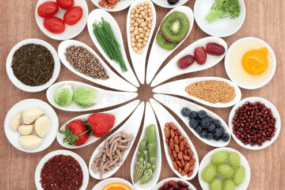
In the world of nutrition and wellness, the term “superfood” is often used to describe certain foods that are packed with nutrients and offer a wide range of health benefits. While there’s no official scientific definition of the term, superfoods are typically nutrient-dense and contain vitamins, minerals, antioxidants, and other compounds that can help prevent disease, promote longevity, and support overall well-being. In this article, we will uncover what superfoods are, why they’re important, and which ones you should incorporate into your diet for optimal wellness.
What Are Superfoods?
Superfoods are whole foods that are considered exceptionally nutritious due to their high concentration of vitamins, minerals, and other beneficial compounds. These foods are often plant-based, though there are a few animal-based superfoods as well. They are recognized for their ability to provide a variety of health benefits that support optimal functioning of the body and mind.
The primary appeal of superfoods lies in their nutrient density. A small serving of these foods provides a significant amount of essential nutrients, including antioxidants, fiber, healthy fats, and proteins, which may help prevent chronic diseases such as heart disease, diabetes, and cancer. Additionally, superfoods can play a role in improving energy levels, supporting digestive health, and promoting healthy skin and hair.
Why Superfoods Matter for Wellness
A balanced and varied diet is essential for optimal wellness. While there are many foods that provide individual benefits, superfoods stand out due to their extraordinary ability to deliver a wide range of nutrients in a compact and easy-to-consume form. Incorporating these nutrient-dense foods into your diet can help you achieve various wellness goals, such as:
1. Enhanced Immune Function
Superfoods are often rich in antioxidants, vitamins, and minerals that support immune health. These nutrients help protect the body from harmful pathogens and strengthen the immune system’s ability to fight infections and illnesses.
2. Improved Heart Health
Many superfoods, such as fatty fish, leafy greens, and berries, contain nutrients like omega-3 fatty acids, fiber, and flavonoids that promote heart health. These nutrients can help lower cholesterol, reduce inflammation, and improve blood circulation, all of which are vital for maintaining cardiovascular health.
3. Increased Energy and Vitality
Superfoods provide a steady source of energy by supplying the body with essential nutrients like complex carbohydrates, proteins, and healthy fats. These foods help stabilize blood sugar levels, which in turn helps prevent energy crashes throughout the day.
4. Better Digestive Health
Superfoods such as fiber-rich fruits, vegetables, and whole grains promote healthy digestion by supporting a balanced gut microbiome. Fiber helps regulate bowel movements, while probiotics found in foods like fermented vegetables and yogurt support gut flora.
5. Clearer Skin and Healthy Hair
Certain superfoods contain compounds that promote healthy skin and hair. For instance, foods rich in vitamin C, like citrus fruits, help stimulate collagen production, which is essential for skin elasticity. Omega-3 fatty acids, found in fatty fish and flaxseeds, nourish the skin and reduce inflammation.
Top Superfoods to Incorporate Into Your Diet
Now that we understand the significance of superfoods for overall wellness, let’s dive into some of the most powerful and beneficial superfoods to include in your diet. These foods are packed with nutrients and can provide numerous health benefits.
1. Blueberries
Blueberries are often hailed as one of the best superfoods due to their high antioxidant content, particularly anthocyanins. These powerful antioxidants help fight oxidative stress, which can contribute to aging and disease development. Blueberries are also rich in vitamin C, fiber, and vitamin K. Regular consumption of blueberries may help improve brain function, enhance memory, and reduce the risk of heart disease.
2. Kale
Kale is a leafy green vegetable that is packed with essential nutrients such as vitamins A, C, and K, as well as calcium, iron, and fiber. It’s also rich in antioxidants like flavonoids and carotenoids, which have anti-inflammatory and anti-cancer properties. The high fiber content of kale helps promote digestive health and maintain a healthy weight.
3. Salmon
Salmon, particularly wild-caught salmon, is one of the best sources of omega-3 fatty acids, which are essential for heart health and brain function. Omega-3s help reduce inflammation, improve blood circulation, and lower cholesterol levels. Salmon is also an excellent source of high-quality protein and vitamin D, both of which are important for maintaining muscle health and bone strength.
4. Chia Seeds
Chia seeds are tiny yet mighty superfoods. These little seeds are packed with omega-3 fatty acids, fiber, protein, and antioxidants. Chia seeds are also a great source of calcium, magnesium, and iron, which support bone health. The soluble fiber in chia seeds helps regulate blood sugar levels and promotes gut health by supporting healthy bowel movements.
5. Avocados
Avocados are nutrient-dense fruits that contain healthy monounsaturated fats, which are beneficial for heart health. They are also rich in fiber, potassium, vitamin E, and folate. The healthy fats in avocados help reduce bad cholesterol levels while supporting brain function and hormone regulation. Avocados are also great for skin health due to their high content of antioxidants and healthy fats.
6. Quinoa
Quinoa is a gluten-free, whole grain that is an excellent source of plant-based protein and fiber. It is also rich in vitamins and minerals such as magnesium, iron, and potassium. Quinoa is a complete protein, meaning it contains all nine essential amino acids, making it a perfect choice for vegetarians and vegans. It is also easy to digest and helps maintain stable blood sugar levels.
7. Turmeric
Turmeric is a yellow spice that contains curcumin, a potent anti-inflammatory compound that has been shown to support joint health, improve brain function, and reduce the risk of chronic diseases. Turmeric is often used in cooking, particularly in curries and soups, and can be consumed in the form of supplements or as a spice in teas and smoothies.
8. Spinach
Spinach is a leafy green vegetable that is high in vitamins A, C, and K, as well as folate, iron, and magnesium. It is also rich in antioxidants like lutein and zeaxanthin, which promote eye health and reduce the risk of age-related macular degeneration. Spinach is a versatile superfood that can be added to salads, smoothies, and soups.
9. Garlic
Garlic is a powerful superfood that has been used for centuries for its medicinal properties. It contains compounds like allicin, which have been shown to reduce blood pressure, improve cholesterol levels, and enhance immune function. Garlic also has antimicrobial and anti-inflammatory properties that help protect the body from infections and chronic diseases.
10. Cacao (Raw Chocolate)
Raw cacao is a rich source of antioxidants, particularly flavonoids, which help protect the body from oxidative damage. It is also high in magnesium, iron, and potassium, making it a great option for boosting heart health. Cacao has mood-boosting properties due to the release of endorphins and serotonin, which can help combat stress and anxiety.
11. Sweet Potatoes
Sweet potatoes are nutrient-dense root vegetables that are high in fiber, vitamins A and C, and potassium. They are a great source of complex carbohydrates, providing a steady release of energy without causing blood sugar spikes. Sweet potatoes also contain beta-carotene, a potent antioxidant that supports immune function and eye health.
12. Goji Berries
Goji berries are small, nutrient-packed fruits that have been used in traditional medicine for centuries. They are rich in vitamin C, antioxidants, and amino acids, which help improve immune function, promote healthy skin, and support eye health. Goji berries are also known for their ability to help maintain healthy blood sugar levels and improve brain function.
Conclusion
Superfoods are an essential part of a balanced diet that can support optimal wellness and prevent disease. By including a variety of nutrient-dense foods like blueberries, kale, salmon, and chia seeds, you can provide your body with the necessary nutrients to thrive. These superfoods offer numerous health benefits, from boosting immune function to supporting heart health and improving skin appearance. By making superfoods a regular part of your meals, you can unlock the full potential of your health and well-being.
Remember, the key to a healthy diet is variety and balance. No single food can provide all the nutrients your body needs, so it’s important to eat a wide range of nutrient-dense foods. Incorporating superfoods into your meals is a great way to nourish your body and promote long-term health, vitality, and wellness.























